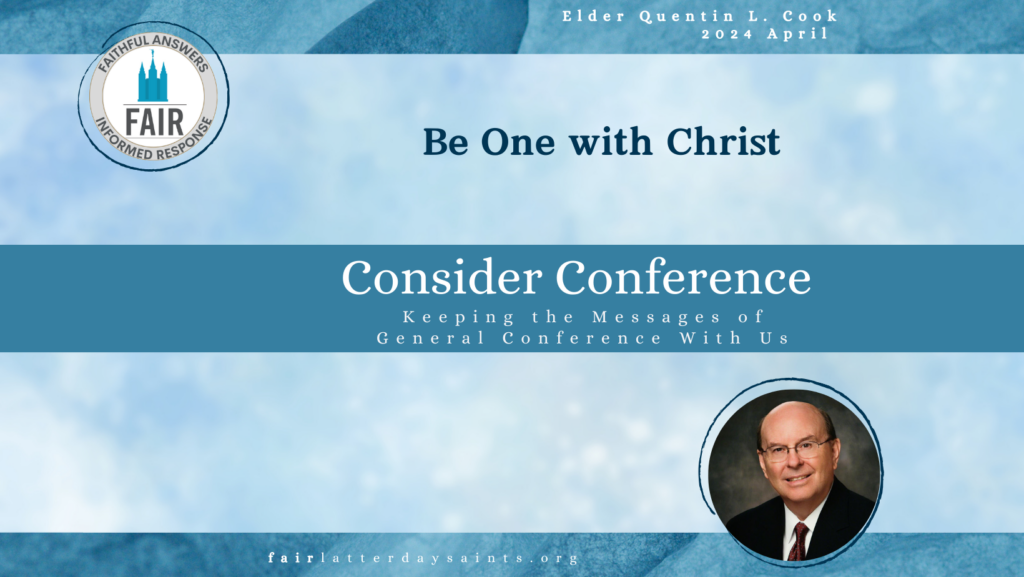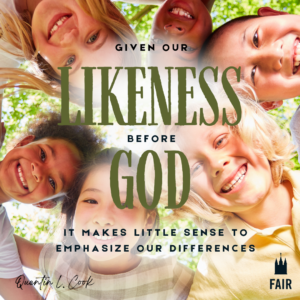
2024 April General Conference, Saturday Afternoon Session
Elder Quentin L. Cook
of the Quorum of the Twelve Apostles
Summary
- We are united by our love of and faith in Jesus Christ and His Atonement. The essence of truly belonging is to be one with Christ.
Gospel Doctrine & Principles taught
Oneness, charity, agency
Scriptures
Moroni 7:27–28, 2 Nephi 9:41, John 17:20, John 17:21–22, Doctrine and Covenants 20, Doctrine and Covenants 20:17–36, 2 Nephi 2:7, Doctrine and Covenants 20:37, 2 Nephi 26:33, 2 Nephi 26:28, Alma 1:4, Doctrine and Covenants 29:49–50, 2 Nephi 2:27–28, Doctrine and Covenants 58:27, 2 Nephi 2:27, Moses 4:3, Alma 41:10, 1 Nephi 2:4, Doctrine and Covenants 20:29–31
Other Sources
16 Not Doubting nor Despairing
Peter Wood, Diversity: The Invention of a Concept (2003), 20.
True to the Faith: A Gospel Reference (2004), 12.
Poetical Works of Ella Wheeler Wilcox (1917), 129.
Related talks:
- D. Todd Christofferson, “Moral Agency”
- Russell M. Nelson, “Think Celestial!,”
- Neal A. Maxwell, “Response to a Call,”
- Russell M. Nelson, “Building Bridges,”
Look for Jesus Christ:
- Testimony of Christ.
- I can remember to this day the great love and appreciation Grandpa had for the Savior and His Atonement.
- I bear my sure and certain witness that Jesus Christ lives, and because of His Atonement, we can be one with Christ. In the sacred name of Jesus Christ, amen.
- Description of His Atonement.
- I have felt deeply about the Atonement of Jesus Christ since I was quite young
- no one can return to God by good works alone without the benefit of the Savior’s Atonement.
- Oneness with Christ and our Heavenly Father can be obtained through the Savior’s Atonement.
- salvation comes as Jesus Christ justifies and sanctifies repentant souls because of the Savior’s grace. (D&C 20) sets the stage for the preeminent role of His Atonement.
- Description of His relationship with us.
- Christ is “the Keeper of the Gate”
- The words of Christ
- “that they all may be one; as thou, Father, art in me, and I in thee, that they also may be one in us.”
- “And the glory which thou gavest me I have given them; that they may be one, even as we are one.”
- Oneness is what Christ prayed for prior to His betrayal and Crucifixion.
- The Lord’s saving mercy is not dependent on lineage, education, economic status, or race. It is based on being one with Christ and His commandments.
- The content of this revelation (D&C 20) is truly remarkable. It teaches us the significance and role of the Savior and how to access His power and blessings through His atoning grace.
- The doctrine, principles, sacraments, and practices that the Lord established through Joseph Smith, the Prophet of the Restoration, are truly seminal.
- It is significant that all the qualifications for baptism are spiritual. No economic or social attainment is necessary. The poor and the rich have the same spiritual requirements. There are no race, gender, or ethnicity requirements. The Book of Mormon makes it clear that all are invited to partake of the Lord’s goodness, “black and white, bond and free, male and female; … all are alike unto God.” “All men are privileged the one like unto the other, and none are forbidden.”
- Given our “likeness” before God, it makes little sense to emphasize our differences.
- Some have wrongly assumed that because all people are invited to receive His goodness and eternal life, there are no conduct requirements. However, the scriptures attest that all accountable persons are required to repent of sins and keep His commandments.
- To receive the blessings of the Savior’s Atonement, we must affirmatively exercise our moral agency to choose Christ and obey His commandments.
- A fundamental doctrine of our faith is that we do have moral agency, which includes free will. Agency is the ability to choose and act. It is essential to the plan of salvation. Without moral agency, we could not learn, progress, or choose to be one with Christ. Because of moral agency, we “are free to choose liberty and eternal life.”
- The Father’s plan included agency as an essential element.
- We are free to choose and act, but we do not control the consequences.
- In this extremely competitive world, there is a constant effort to excel. Striving to be the best we can be is a righteous and worthwhile endeavor. It is consistent with the Lord’s doctrine. Efforts to diminish or deprecate others or create barriers to their success are contrary to the Lord’s doctrine. We cannot blame circumstances or others for a decision to act contrary to God’s commandments.
- In today’s world, it is easy to focus on material and occupational success. Some lose sight of eternal principles and choices that have eternal significance. We would be wise to follow President Russell M. Nelson’s counsel to “think celestial.”
- The most significant choices can be made by almost everyone regardless of talents, abilities, opportunities, or economic circumstances.
- For the most important choices, we do have control.
- On matters of principle, conduct, religious observance, and righteous living, we are in control. Our faith in and worship of God the Father and His Son, Jesus Christ, is a choice that we make.
- We should strive to include others in our circle of oneness.
Lists
Elder Cook’s grandfather advised him to:
- avoid any sense of entitlement or privilege because of his faithful ancestors
- Focus on the Savior
- Focus on the Savior’s atonement
- Remember that we are all children of a loving Heavenly Father
- Remember that we each will report to the Savior on how well we kept the commandments
A summary of essential Church doctrine (contained in D&C 20):
- the reality of God
- the Creation of mankind
- the Fall
- Heavenly Father’s plan of salvation through the Atonement of Jesus Christ
- requirements for baptism into the Lord’s Church
- the sacrament prayers
Requirements for baptism:
- humility before God
- a broken heart
- a contrite spirit
- repenting of all sins
- taking upon us the name of Jesus Christ
- enduring to the end
- showing by our works that we have received of the Spirit of Christ
About moral agency:
- Moral agency includes free will
- Agency is the ability to choose and act.
- It is essential to the plan of salvation.
- Without moral agency, we could not learn, progress, or choose to be one with Christ.
- Because of moral agency, we “are free to choose liberty and eternal life.”
Invitations/Challenges
- To receive the blessings of the Savior’s Atonement, we must affirmatively exercise our moral agency to choose Christ and obey His commandments.
Warnings
- avoid any sense of entitlement or privilege because of your faithful ancestors
- Please understand I am not advocating less interest in education or occupation. What I am saying is that when efforts relating to education and occupation are elevated above the family or being one with Christ, the unintended consequences can be significantly adverse.
Stories:
- Elder Cook shares a meaningful experience from when they were 25, just after graduating from Stanford Law School and while studying for the California bar exam. Upon hearing that their 86-year-old grandfather, Crozier Kimball, was dying, they traveled to Utah for a visit. Crozier was pleased to see them and shared his testimony, emphasizing that despite having faithful ancestors like his father, David Patten Kimball, and his grandfather, Heber C. Kimball, true focus should be on the Savior and His Atonement. Crozier counseled them to avoid any sense of entitlement based on their heritage, reminding them that all will answer to the Savior, the “Keeper of the Gate” as described in 2 Nephi 9:41, for how well they kept His commandments. He expressed his hope that he had repented enough to receive the Savior’s mercy. The speaker was deeply moved by their grandfather’s humility and love for the Savior, and the visit strengthened their appreciation of the Atonement, which they have carried with them ever since.
- In 2019 during an assignment in Jerusalem, I visited an upper room which may have been near the site where the Savior washed His Apostles’ feet prior to His Crucifixion. I was spiritually touched and thought of how He commanded His Apostles to love one another.
- On the recent cover of a major university alumni publication, a prominent biologist-professor asserts, “There’s no room for free will.” Not surprisingly, the professor is quoted in the article as saying, “There’s no such thing as God, … and there’s no free will, … and this is a vast, indifferent, empty universe.” I could not disagree more strongly.
- Going back to my missionary days, Elder Marion D. Hanks, our mission president, had all of us memorize part of a poem by Ella Wheeler Wilcox: There is no chance, no destiny, no fate, Can circumvent or hinder or control The firm resolve of a determined soul.
Application Ideas
- Prayerfully look at your own life and consider if your time at work or school are “elevated above the family or being one with Christ.” Make a note of any area of your life you feel is out of balance.
- How can I include others in my circle of oneness this week?

